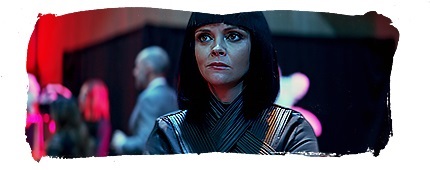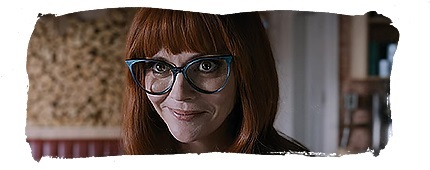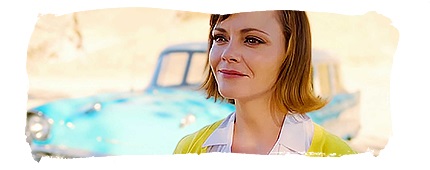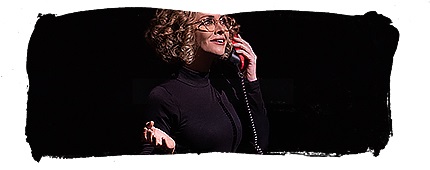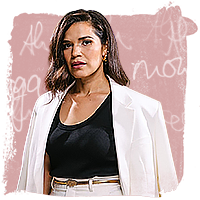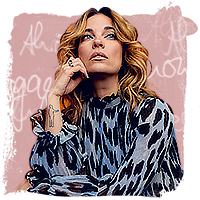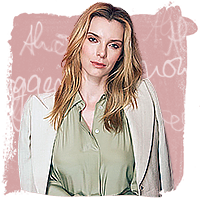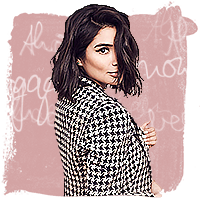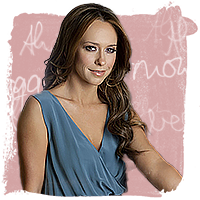
The Hollywood Reporter – May 25, 2022
Lacey Rose
May 25, 2022

“She’s so beautiful even when she cries,” said Emmy Rossum. The Angelyne star was seated next to Squid Game breakout Jung Ho-yeon, whose face was lined with tears as she reflected on her meteoric and anxiety-ridden rise at The Hollywood Reporter‘s Drama Actress Emmy Roundtable in late April. The model turned actress said she’d been fairly certain her first performance had been something of a disaster, so much so that she apologized to its director upon screening what would later become the most watched series in the world. Over the course of an hour, Jung’s peers — Rossum, Pam & Tommy‘s Lily James, Yellowjackets‘ Christina Ricci, Killing Eve‘s Sandra Oh and DMZ and Dopesick‘s Rosario Dawson — gave her a crash course on navigating Hollywood and her own insecurities. It was, as she put it, a very good “therapy session.”
Christina, I’ve heard you say that when you would put on your character’s wig and glasses, people would treat you differently on set. What did that look like?
CHRISTINA RICCI It was amazing. And great for me as an actress because I was like, “This is what this woman’s been putting up with her entire life.” And I’m just like, “It’s still me, I’ll still kill you, I just happen to have this wig on.”
SANDRA OH So, you feel because of the physical transformation and what we knew Misty [your character] to be, people would treat you like Misty?
RICCI It’s just people seeing a woman who looks like that, honestly. You see a woman that’s that dismissible because she has no social currency, she’s not hot, she’s not powerful, and then I’m really little and I’m wearing pastel, kitten things and dorky glasses, and people’s natural reaction is to give that person a hard time. It was amazing because I’ve never been on a set where people felt so free to give me a hard time.
Lily and Emmy, you went through significant physical transformations for your roles, too. Do you feel like people treated you differently when you were in character?
EMMY ROSSUM The first time that I put it all on, it was for a pitch for the network. It was the last beat of selling the show before we got the green light, and it was a surprise presentation at the end. I walked across the Universal lot in everything. And this character, she’s a living, breathing piece of art, a performance artist, and I’m somebody who does not covet that attention as I walk down the street. So, I saw the way people on the lot looked at me, and it was the first time I understood the power of being in an ultra-curated, hyperfeminine body.
LILY JAMES I felt so brave in my sexuality because it was so not me and because there was so much I put on. It was like I had the strength of this armor that allowed me to be like, I don’t even know, maybe more in my body or at least [more comfortable] with eyes on me that aren’t, like, my partner. (Laughs.)
You both spent many hours in that hair and makeup chair, but what was the moment in that process where you locked into these characters?
ROSSUM Some days were eight hours [in the makeup chair].
RICCI Oh my God.
JAMES Wow, that’s longer than I had, but it’s incredible how we see you so young and then we see you much older. And she’s in her 50s toward the end, right?
ROSSUM We don’t believe in age. (Laughter.)
JAMES Right, right. It’s so remarkable seeing that change not only in how they did it physically, but in your attitude and your voice.
ROSSUM I’d walk the reservoir for months just listening to these meditation tapes [of Angelyne’s] and I’d take lots of pink bubble baths saying these phrases repeatedly until I felt like I hooked into something like a mantra.
JAMES Yeah, the voice was pretty key for me, too. I found the note on the piano because it was such a different pitch, so I could almost relate to it from a singing point of view. But I always feel the costume fitting is the moment where you go, “Oh, this is it.”
ROSSUM There’s some liberation in the moment that they spin you around for the big reveal. I did not recognize myself. Sometimes I have two contact lenses in each eye. It’s not even my earlobes. There’s nothing of me that I can see. And at first, I was scared because I didn’t see myself at all. I was like, “Oh God, where have I gone? I’m not there anymore.” And then I felt this, “Oh, I’m not there anymore, I can do anything without any judgment. I can go as far as the world will let me go because it’s not me anymore.”
Ho-yeon, you kept journals and created an internal life for your character. What did that entail?
JUNG HO-YEON It was based on the script, so I was not making up the story, I just extended the story and the experience by writing down, like, a smell or an emotion as if I were there at that moment. And it was just for me.
ROSSUM I like having those secrets, those things that you don’t need to tell your director: what you think you had for lunch or what you cried about that morning. Your backstory can be your own. And even if somebody’s like, “Oh, well, she was probably X.” It’s like, “Oh, OK.” (Shakes her head no.)
How much did you all know about what was to come for your characters? And if you didn’t know much, is there a freedom in not knowing, or are you asking a ton of questions trying to figure it out?
ROSARIO DAWSON I did film for so long before I got into doing TV, and it was such a different process to agree to do something before you’ve read everything [and know how it plays out]. I just think that’s so weird.
RICCI Yeah, I had a really hard time not being able to know on this show. Until the very end, I grappled with it because with a movie, you know everything, so then you can sit with it and decide exactly [how to be]. But with TV, your character all of a sudden does things, and you’re like, “Really?” Like, in the second episode of Yellowjackets, Misty goes on a date, and I was like, “I would not have thought that she had any interest in men at this point. Well, OK.” And it was very unnerving for me and it feels like a different skill to me.
OH It depends on the project. [On] some, you do have the scripts.
JAMES Yeah, I had all of them.
OH I’m interested in Ho-yeon’s experience. Did director Hwang [Dong-hyuk] direct all of them?
JUNG Yeah. My experience was very different because Hwang used to be a movie director and so the scripts were just fully there and we knew what to do. There was a path that he wanted us to go on. I was lucky.
OH I find it very, very challenging when you don’t have them all.
DAWSON There was a film I was going to do and then I came to the table read and they changed my character and I walked away from it. I was like, “This is not what I signed a contract for. You’ve broken our contract.” And then I remember being on a show and they made that pivot and I was like, “Oh I can’t, I’m already filming this.”
RICCI Nothing you can do!
DAWSON And then there are certain battles that you have when there are different directors who come in and different crews, and there are different styles, and then different writers come on board and they decide certain things about the language that your character uses, and now you have to fight for your character. You don’t necessarily know where it’s all going, but you’ve lived in this person long enough to know that this dishonors who she is. And you wonder, “If I hadn’t had so much work behind me, where would I be to fight for this?”
Rosario, you’re also doing Star Wars and Marvel fare. When it’s that big and mechanical an operation, do you still have that power to push back or do you cede it?
DAWSON You try! And I feel really lucky I didn’t get into a lot of those spaces until after I’d been working with a lot of other people. I was on set with Spike Lee at 18, and you’re fighting for your character and being taught to do so, because he was teaching me to do that, which was really cool. I look back on the two films I did with him [1998’s He Got Game and 2002’s 25th Hour] and how much I learned from him and from so many other people. I was very specific about directors that I wanted to work with, even if the characters might be girlfriend roles or story devices. And I figured out the importance of [having] the fight early on, because once you wrap in three months or whatever it is, that’s it. Someone’s going to make an editing choice or a musical choice, you have no control.
OH I feel like the way that you get that voice is to get a producer credit. And it took me a long time to get that credit, but if you really want to have control over your character and to be in the room while it’s being developed or to have a say, you need it. For both The Chair and the final season of Killing Eve, it’s exactly that, there are new people coming in all the time, so it’s, “Let me help you.” It’s ridiculous, but sometimes you do need to have the boundary and the protection of a title to say, “I get to be in this room.”
Christina, I’ve heard you talk about the younger actors on your show having that confidence and wherewithal to push back. It sounded like that surprised you. Was that different from how you came up in this industry?
RICCI I think I was speaking about how wonderful it is now that younger actresses are in a place where they can create boundaries for themselves and “I will do this and I won’t do that,” and they’re not “difficult,” they’re just creating their boundaries. I was always afraid of being fired. Even now, I have to be like, “It’s OK, you are not going to get fired, you can [speak up].” All the older actresses would talk quite a bit about how impressive it was to see young women saying, “I’m not comfortable doing that intimate scene.” Or saying, “That is not how I need to work.” Things at their age that I would not have felt confident enough to do — and I think the industry would not have been accepting of it, either.
DAWSON It’s definitely changed. And it is great hearing older actresses talk about what that journey was. It’s definitely informed me in certain choices that I’ve made on set. But the way that the world exists now, young people have a creative license and a sense of entitlement that’s quite magnificent because they don’t expect to grow up and have a voice — they expect to have a voice right now.
What are the things that you’ve felt you needed to fight for and did?
OH The script. It’s always No. 1, because that’s the thing we work with. In TV, directors are going to come on and, honestly, you have to catch them up to speed. So, if they have the same line that you’re reading, there’s less to explain. When I moved to L.A., I started on this show [Arli$$] for HBO, a half-hour comedy about sports. I was, like, 24 and the only girl on set, it was a very male-heavy show, but I was very close with the writers, and TV is all about that relationship.
DAWSON I don’t always just have opinions about my character, though. Sometimes people just miss stuff, really simple things, like, I was working on something and it was a robot and I was like, “I don’t know that a robot would say, ‘Never.’ ” And again, I go back to Spike, who does a lot of rehearsal, which is something not everybody does, and I’m really glad I started there because it’s so hit-the-ground-running on so many other projects. They just do not make that time. I learned that [rehearsal] is where you get to play with it. He is not super attached to the script at that point. He’s like, “Let’s see where it goes.” But once we start shooting, he’s out of there by 7 p.m. to go to the [Knicks] game, so there’s no, “I just thought maybe I’d try it.” No, now there’s no time.
OH Right.
DAWSON By the time I got to 25th Hour and I’m working with Ed Norton, who was wanting to rewrite stuff and do all kinds of things, I was like, “This [the period before we shoot] is your sweet spot, dude. Let’s work on this scene right here, right now.” We watched On the Waterfront, we saw this whole gimmick thing that we wanted to play off of, and we worked on it, presented it and got the green light, and then we were able to really go for it when we were performing. I’ve really taken that [lesson] with me and also sussed out that relationship with the director or the showrunner, and you figure out who is that visionary that can collaborate with you, and sometimes people won’t. I’ve definitely been with people whose direction is, like, “Can you just move your head like Rosie Perez, or do only Black people do that?” And I’m like, “Did you just say that?”
RICCI Or, “Your eyes are already a little crazy, just make them look less crazy for this one.”
DAWSON Yeah, thanks, I’ll take that note to heart.
OH My God, that’s terrible.
DAWSON And it’s frightening. It’s like, you’re a terrible person and a terrible communicator, but you’re at the helm of this project? We’re in danger. It’s like you see red lights flashing and you’re looking at everyone who’s putting their blood, sweat and tears into it and you’re going, “OK, how do we work with this person who clearly doesn’t care in the same way and who has a very different agenda than the rest of us?”
JAMES I found in a strange way, at work, I’m much more articulate and forceful, especially when it comes to my character or the story, I will not let it go. Whereas in life, I wish I had such good boundaries. (Laughs.) On Pam & Tommy, the writer and I, we were speaking and butting heads, and the producers, too. And that side got a little hard because sometimes it was taking over the behind-the-scenes discussions about how much I wanted certain things to be in the right place and the intentions to be right, but as long as someone’s listening to you — and I can tell when they’re just smiling and nodding at the actress, like, “OK …” But when it does feel like an open communication and you’re being heard, it’s so exciting, which I bet is way different than women would have said even 10 years ago.
Do you feel like speaking up has ever cost you work?
RICCI I had a really hard time when I was younger. And I saw that people did not want to work with me again because I was very up front and open and opinionated to the point where it was like, “Maybe we can say this in another way?” Like, take a breath and come back, which I learned to do. But I was so sure I was right about my character sometimes that I think it did affect me a little bit negatively. Now I am older and I’m not quite as aggressive and there is more of an openness to, “This will be a collaborative process.” And I think even my aggressiveness probably came from the fact that I knew I was not going to be listened to. I expected to be dismissed beforehand, but now it feels very different.
Sandra, I’ve heard you say that you read the script for The Chair and your character’s name spoke volumes about how much has changed during the course of your career. How so?
OH Ultimately, change is slow … but yes, the character’s name is Ji-Yoon Kim, and that was the first time I played a character who has a Korean name. So, every single person in that cast has to call me Ji-Yoon, has to learn it, has to go through it, will say it wrong, and that’s OK, let’s keep on trying to get it right and I will help you with that. It’s also part of our job (pantomimes carrying something heavy on her back). But it’s about getting to the point of normalizing it and, at the point where The Chair comes, it’s been, like, 25 years of someone working to try to get a character whose name is actually Korean. So, it was great for me. But The Chair was great for a lot of reasons. It’s really hard to do the half-hour comedy and have it be about a lot of shit from different points of view and trying to tackle nuance and culture and midlife romance in a sophisticated way. But yeah, that name, it meant something to me — and it’s great if it doesn’t mean anything to younger people.
Lily, I believe you went into Pam & Tommy thinking you would, at the very least, speak to Pamela Anderson, but that didn’t happen. I’m curious what that process entailed for you and how it then informed how you inhabit her? And is it, perhaps, a blessing in disguise to not have her in your head?
JAMES That was really difficult, honestly, particularly given what the show is about [a reframing of Anderson’s story to expose the exploitation and misogyny that she endured]. And I really, truly believed she would be involved, and once [I recognized that she] wasn’t, I battled a lot with everything about the show, from the challenge as an actor to what I was trying to say and my reasons, personally, for why I wanted to explore the things within it. It felt deeply personal, and I think that’s why I became fiercely protective. There were a lot of things I actually changed, moments of the show, because it starts off more salacious, but I never wanted it to be like we were taking advantage or [just showing a] lot of sex. And I wasn’t a producer, but I was listened to — and it made me realize I always want to be a producer. I can’t just stop thinking about a project and go, “OK, next job.” I’m still itching to know how it’s taking shape. But yeah, on some shows, actors say it’s actually great not to have the person involved because you want your imagination to skyrocket and you don’t want someone necessarily breathing down your neck. Like, you want to do them justice, but you also want to be free. But I wish it had been different.
Emmy, you met with Angelyne. How does that then inform you? Is she in your head? Those things that people do get concerned about, were they real for you?
ROSSUM Of course. And her first words to me were, “So, why do you have such a hard-on to play me?”
Wow. What did you say?
ROSSUM That’s exactly why, because you’re a force. And because you’re uncompromising and a rebel and because you’re in the power position in every room you walk into. And those questions of who has the right to tell the story is at the crux of our show. All of these people try to tell her story and co-opt her power, but alongside that, we’re using her true-life dialogue and her self-mythology, and every time somebody tries to take that from her, we have her character come in and, through her own words and her storytelling, take you away to this better place. And in the end, hopefully when we land the plane, it’s fully steeped in more mystery. Because ultimately, like Pam & Tommy, it’s not a biopic — like, there’s a talking penis [in your show].
JAMES Right. (Laughs.) This is not the final say.
Ho-yeon, Squid Game was your very first acting project. I suspect you didn’t know this was going to be the biggest show …
JAMES Ever.
JUNG No. (Laughter.)
So, you’re effectively shot out of a cannon. Take us back to what it was like right before this show premiered and then just after. What were the early signs that your life was about to change?
JUNG We watched Squid Game before it came out. The actors did because we had to do promotion and events and stuff, and I thought … am I allowed to swear?
OH Yeah.
JUNG I thought I fucked up.
JAMES Oh my God, you’re great.
JUNG I thought I totally messed up. My first message to director Hwang after I watched Squid Game was, “I am so sorry. And thank you so much for casting me.” I’m going to cry. It was so stressful. I was trying to prepare for the bad reactions and everything, but … (Begins crying.)
RICCI But you’re so amazing in it.
JAMES Incredible!
RICCI This is why I don’t watch myself.
ROSSUM It’s overwhelming. And sometimes it can feel quite exposing, too, because it’s so personal and then it doesn’t belong to you anymore.
JUNG Yeah.
ROSSUM (Turns to Jung.) Aw, she’s so beautiful even when she cries.
JAMES Have your feelings about it changed now?
RICCI Yeah, do you still think that you fucked up?
JUNG No. Maybe it was better than I thought. (Everyone claps.)
JAMES It always is.
JUNG And then things go so fast. Like, doing this interview with you guys, it’s just doesn’t make sense for me. I’m trying to catch on to what you’re saying …
OH It’s super intense.
JUNG Yeah, and because I just started, I never thought about what was going on in this industry. I just wanted to act, but there are things going on, and I have a responsibility to know and educate myself.
RICCI It can be really overwhelming, and you’re probably going to need a little time to yourself. But I will tell you, I still watch myself and immediately have that feeling every time.
OH Every time. “It didn’t work, it was a disaster.”
JUNG Every time?
RICCI Every time. So that might never change, but remember that you’re also not always right about your own performances.
How have you thought about what’s next, Ho-yeon?
JUNG I’m reading a lot of scripts and just starting to educate myself. Like, do you want to tell people about this woman’s life? Or this woman’s life? And then the other side, I’m thinking, “I just want to try everything so that I can have more of a sense of what I like, what I want to do.” But for now, I just have to keep going even though I make mistakes. Even though I just cried right now. I don’t even know why I cried, but I just have to fight with my anxiety and keep learning and trying.
RICCI What’s great is we’re at a time now where everybody has had a lot of discussions about what it is to be human, and you no longer have to be flawless.
JUNG You don’t have to hide it.
RICCI You don’t have to hide that you’re nervous and all those things. And that’s right, you just keep going. You are you in this moment going through this journey, and nothing that you do can be wrong.
DAWSON I have to say that people talking about the mental health of this process and the exposure of it has been a really welcome change in the industry. We can be emotional and we can show who we are behind our characters.
ROSSUM (Hugs Jung.) You’re OK. We’re here.
JUNG This is like therapy.
ROSSUM But this didn’t used to happen. This is good.
JAMES (To Jung.) We had an audition [together] recently, and I was blown away by you. Your spirit, you were the life force, and it took me aback. Spirit pours out of you, so just keep going.
DAWSON The thing people don’t always necessarily appreciate or understand is the bravery that comes with this job, and how we’re pushing past our own anxiety oftentimes and our own stress and fear. Just walking down the street and being stared at, I think a lot of people, especially during this pandemic putting masks on, have felt the benefit of what that is, to blend in and have that privacy.
OH Oh, it’s fantastic.
ROSSUM I mean, I had a baby without anyone knowing!
DAWSON Which is remarkable …
It really is. I’m afraid we are out of time …
JAMES Oh, I have such a burning question that I wanted to ask [because] we were talking about shedding a character and it’s so rare that you’re seated around a table with women like you, and I’d love to know how you guys do that because I find it so hard to let go.
OH I ritualize the whole thing because you need to signal to your psyche that you are letting go of what you’ve been living in. I also get body work [like a massage] done because I have got to process that shit out immediately. And then anything that you can come up with, write a letter, whatever.
DAWSON I get really into the research around how your brain changes — you’ve literally built up different pathways and synapses. So, I have to be gentle with myself and be really communicative with my family, and sometimes I forget to do that and can be sharp or really emotional and I’m like, “Where’s that coming from? Oh right, because for eight to 12 hours a day for several months, my body doesn’t know the difference.” It’s not something you can just take on and off. That’s why people fall in love or change their whole lives around on set. You can’t just say, “I’m pretending to love someone.” If you were to do a brain scan, it would register as real.
JAMES I wish people talked about this more.
ROSSUM There’s also a grieving process. I have a couple strategies, from an ice-cold shower to different breathing patterns to quiet your nervous system. And then I just remember that experience is part of me, and if ever I’m in the grocery store by myself and I want to walk down that aisle like that person, I can do that.
DAWSON That’s awesome.
ROSSUM And they’re right there. It’s like an old coat in your closet that you can put on or it’s your secret best friend in your pocket.












